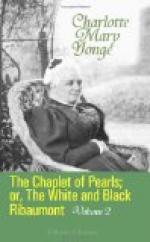‘Is the man here? Let me see him,’ said Berenger, hastily.
He was at once sent for, and proved to be one of the stable servants, a rough, soldierly-looking man, who made no difficulty in telling that M. de Nid de Merle had bidden his own troop to use every effort to reach the Widow Laurent’s house, and secure the lady. They had made for it, but missed the way, and met with various obstacles; and when they reached it, it was already in flames, and he had seen for a moment Mademoiselle de Nid de Merle, whom he well knew by sight, with an infant in her arms at an upper window. He had called to her by name, and was about to send for a ladder, when recognizing the Ribaumont colours, she had turned back, and thrown herself and her child into the flames. M. de Nid de Merle was frantic when he heard of it, and they had searched for the remains among the ruins; but, bah! it was like a lime-kiln, nothing was to be found—all was calcined.
‘No fragment left?’ said Berenger; ‘not a corner of tile or beam?’
’Not so much wood as you could boil an egg with; I will swear it on the Mass.’
‘That is needless,’ said Berenger. ’I have seen the spot myself. That is all I desired to ask.’
The Chevalier would have taken his hand and condoled with him over the horrible story; but he drew back, repeating that he had seen Widow Laurent’s house, and that he saw that some parts of the man’s story were so much falsified that he could not believe the rest. Moreover, he knew that Eustacie had not been in the town at the time of the siege.
Now the Chevalier bona fide believed the man’s story, so far as that he never doubted that Eustacie had perished, and he looked on Berenger’s refusal to accept the tale as the mournful last clinging to a vain hope. In his eyes, the actual sight of Eustacie, and the total destruction of the house, were mere matters of embellishment, possibly untrue, but not invalidating the main fact. He only said, ’Well, my friend, I will not press you while the pain of this narration is still fresh.’
’Thank you, sir; but this is not pain, for I believe not a word of it; therefore it is impossible for me to entertain the proposal, even if I could forsake my faith or my English kindred. You remember, sir, that I returned this same answer at Paris, when I had no hope that my wife survived.’
’True, my fair cousin, but I fear time will convince you that this constancy is unhappily misplaced. You shall have time to consider; and when it is proved to you that my poor niece is out of the reach of your fidelity, and when you have become better acquainted with the claims of the Church to your allegiance, then may it only prove that your conversion does not come too late. I have the honour to take my leave.’
‘One moment more, sir. Is there no answer as to my brother?’
’None, cousin. As I told you, your country has at present no Ambassador; but, of course, on your fulfillment of the conditions, he would be released with you.’




